|
|
|
Sort Order |
|
|
|
Items / Page
|
|
|
|
|
|
|
| Srl | Item |
| 1 |
ID:
175821
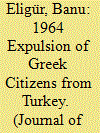

|
|
|
|
|
| Summary/Abstract |
This article argues that the Turkish government facing the 1964 Cyprus crisis applied the principle of negative reciprocity toward Greece and expelled Greek citizens living in Turkey. By doing so, Turkey aimed at pressuring Greece to bring the Greek Cypriot side to the negotiation table. Although Turkish policy proved to be a failure, the expulsions continued. The deportation resulted in the demise of the Greek minority in Turkey for the following reasons: first, there were intermarriages between the Greek citizens and the Greek minority; and second, Turkey’s Greeks finally lost their hope of being treated as equal Turkish citizens.
|
|
|
|
|
|
|
|
|
|
|
|
|
|
|
|
| 2 |
ID:
083687
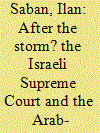

|
|
|
| 3 |
ID:
119963
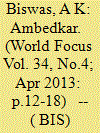

|
|
|
| 4 |
ID:
022400
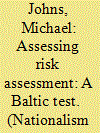

|
|
|
|
|
| Publication |
Spring 2002.
|
| Description |
105-128
|
|
|
|
|
|
|
|
|
|
|
|
|
|
|
|
| 5 |
ID:
058445
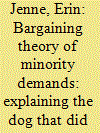

|
|
|
| 6 |
ID:
101342
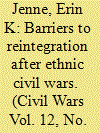

|
|
|
|
|
| Publication |
2010.
|
| Summary/Abstract |
This article evaluates the record of minority return in Croatia, Bosnia and Kosovo to assess the viability of ethnic reintegration in the wake of protracted sectarian violence. Comparative analysis reveals that the logic of post-war ethnic spoils has greatly limited the success of such programmes. What success has been achieved is largely due to third party efforts to disrupt patronage networks and challenge post-war authorities. I conclude that these factors are more significant barriers to reintegration than inexorable ethnic hatreds and fears derived from memories of war. Because such barriers are more readily overcome than entrenched grassroots hostilities, there may be more hope for reintegration than previously thought. However, the systematic failure of the international community to protect and assist prospective minority returnees suggests that continued scepticism of post-war reintegration is in order.
|
|
|
|
|
|
|
|
|
|
|
|
|
|
|
|
| 7 |
ID:
091594
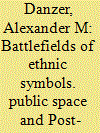

|
|
|
|
|
| Publication |
2009.
|
| Summary/Abstract |
This article provides an analysis of interdependencies between post-Soviet Erinnerungspolitik in public space and the individual perception of urban reconfigurations by ethnic Germans in Kazakhstan. Applying a qualitative social-geographic approach the author examines determinants of the process of ethnic symbolisation of real and imagined places. Individual biography and the extent of Soviet socialisation are factors shaping the personal perception of symbolic landscapes. From the perspective of the individual, space reflects the power distribution within society and hence, impacts on individual identity formation. Depending on the dominance of internal as opposed to external identification, the (perceived) changing ethnicised landscape of cities potentially fuels ethnic tension.
|
|
|
|
|
|
|
|
|
|
|
|
|
|
|
|
| 8 |
ID:
180025
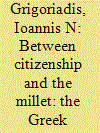

|
|
|
|
|
| Summary/Abstract |
As one of Turkey’s non-Muslim minorities, Turkey’s Greeks have faced substantial pressures since the founding of republican Turkey. As its members could not claim their constitutional rights as citizens of Turkey, emigration soared and the minority reached a point of near extinction. Significant improvements were noted when the EU-supported reform transformed the Turkish state and society from 1999 to 2010, which were not reversed as Turkey relapsed to democratic backsliding in the following years. This article explores the social dynamics and ideological frameworks that have contributed to novel perceptions of the Greek minority since after 2002, the year the Justice and Development Party (Adalet ve Kalkınma Partisi-AKP) came to power and have deterred a significant deterioration since Turkey’s democratic backsliding began. It also examines the state of Turkey’s Greeks by focusing on the state of the pious foundations, the Papa Eftim affair and the situation in the islands of Gökçeada (Imbros) and Bozcaada (Tenedos).
|
|
|
|
|
|
|
|
|
|
|
|
|
|
|
|
| 9 |
ID:
127030
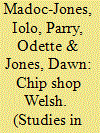

|
|
|
|
|
| Publication |
2013.
|
| Summary/Abstract |
Considerable research has explored the relationship between majority and minority language speaking communities in bilingual contexts. Comparatively little research, however, has explored relations within as opposed to between a language group in these contexts. Antecedent to a new order of social and cultural life in Wales, this article explores how two groups of Welsh speakers, one relatively privileged and one relatively marginalized, positioned themselves as they talked about 'being Welsh speaking'. For all respondents the ability to speak Welsh was understood to confer sameness beyond linguistic competence on Welsh speakers. Claims to a strong Welsh-speaking identity, however, were legitimized by drawing on different resources. Whilst the relatively privileged group identified themselves as 'traditionally Welsh' based on their linguistic and social practices, members of the more marginalized group were unable to define their own linguistic and social practices as 'traditional' for a Welsh speaker. In response they forged a distinctive social space for themselves by developing a class-based communal Welsh identity. With reference to Bourdieu's work on the process of boundary construction and maintenance, this article makes a contribution to understanding ethnolinguistic diversity and how discourses about being Welsh speaking might be reproduced and negotiated in contemporary post-diglossic Wales. It suggests that ethnolinguistic identity may become implicated in the process of classificatory struggle, with social groups emerging through a social space of hierarchical difference.
|
|
|
|
|
|
|
|
|
|
|
|
|
|
|
|
| 10 |
ID:
166738
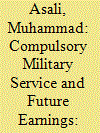

|
|
|
|
|
| Summary/Abstract |
Using Israeli census data, and the random assignment of Arab males to military service, this study provides new evidence on the long-term effects of military service on the earnings of veterans. Among Druze men, we find an economically and statistically significant positive effect of 23% on their wages. The unskilled experience a slightly higher premium. The positive effects are large and intensify over time. Skill enhancement and usual human capital accumulation do not explain the positive effect of military service. Networking during service is proposed as a likely explanation.
|
|
|
|
|
|
|
|
|
|
|
|
|
|
|
|
| 11 |
ID:
002207
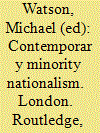

|
|
|
|
|
| Publication |
London, Routledge, 1990.
|
| Description |
xi 227p.
|
| Standard Number |
0415000653
|
|
|
|
|
|
|
|
|
|
|
|
Copies: C:1/I:0,R:0,Q:0
Circulation
| Accession# | Call# | Current Location | Status | Policy | Location |
| 033252 | 320.54/WAT 033252 | Main | On Shelf | General | |
|
|
|
|
| 12 |
ID:
131143
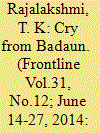

|
|
|
|
|
| Publication |
2014.
|
| Summary/Abstract |
The gang rape and murder of two minor girls in Uttar Pradesh brings to the fore factors such as cast dynamics and police apathy behind the growing crimes against women.
|
|
|
|
|
|
|
|
|
|
|
|
|
|
|
|
| 13 |
ID:
051962
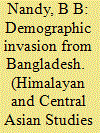

|
|
|
|
|
| Publication |
Jul-Dec 2003.
|
|
|
|
|
|
|
|
|
|
|
|
|
|
|
|
| 14 |
ID:
153013
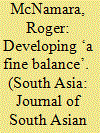

|
|
|
|
|
| Summary/Abstract |
This paper intervenes in the debate over whether secularism can protect religious minorities in India or whether alternative models are needed. I explore this issue by examining Rohinton Mistry's novel Family Matters, which focuses on religious extremism within the minority Parsi community. The novel suggests that the individual needs to maintain ‘a fine balance’ between religious beliefs and personal rights. It recognises that secularisation has shaped modern religious identity and, consequently, facilitated religious extremism. By de-coupling religion from secularisation, Mistry demonstrates that religion need not be rigid and can adapt to different social circumstances, while continuing to provide moral strength.
|
|
|
|
|
|
|
|
|
|
|
|
|
|
|
|
| 15 |
ID:
051959
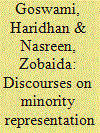

|
|
|
|
|
| Publication |
Jul-Dec 2003.
|
|
|
|
|
|
|
|
|
|
|
|
|
|
|
|
| 16 |
ID:
101038
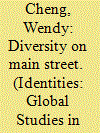

|
|
|
|
|
| Publication |
2010.
|
| Summary/Abstract |
The emergence in the United States of an increasing number of spaces across the socioeconomic spectrum with majority nonwhite populations merits close attention because of these spaces' potential in reconfiguring historical and contemporary claims to place. In an era in which the neoliberalization of urban development has spurred local governments toward more active involvement in defining relationships between race, ethnicity, consumption, and space, "majority-minority" suburbs are particularly important sites of study. In the late 2000s, two branding campaigns in majority-Asian American and Latina/o municipalities in Los Angeles's San Gabriel Valley-a densely populated region popularly known as a "suburban Chinatown"-put forth specific discourses of race, ethnicity, and culture in attempts to actualize specific visions and claims to place, identity, and history. In doing so, these campaigns illuminated and reinforced larger racial, geographic, and ideological divides. "Diversity" on Main Street embraced pluralist multicultural discourses of the nation, while the "Golden Mile" proposal sought to showcase the transformation of a central thoroughfare by ethnic Chinese capital and immigration. A close examination and comparison of these two campaigns shows how struggles over race, geography, and history are intertwined in the contemporary identities of places and integral to the shaping of civic landscapes.
|
|
|
|
|
|
|
|
|
|
|
|
|
|
|
|
| 17 |
ID:
066058
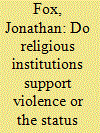

|
|
|
| 18 |
ID:
052062
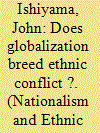

|
|
|
| 19 |
ID:
084012
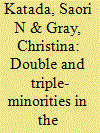

|
|
|
|
|
| Publication |
2008.
|
| Summary/Abstract |
When a female minority professor struggles to establish authority in the classroom, the first question that comes to her mind is, "Is it me?" By surveying more than a dozen female minority professors, we reach the conclusion that those professors face a unique position and particularly demanding tasks in universities as they face challenges of systemic institutional and social underpinning of universities.
|
|
|
|
|
|
|
|
|
|
|
|
|
|
|
|
| 20 |
ID:
100589
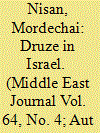

|
|
|
|
|
| Publication |
2010.
|
| Summary/Abstract |
The Druze of Israel constitute a very unique community within the pluralistic, though Jewish-dominated, social map of the country. Their religious heritage and ethnic integrity set them apart, even while they have participated in the political and military domains in close affiliation with the Jewish population. Through research and analysis, a picture emerges of Druze solidarity with the Zionist ethos, as they simultaneously distance themselves from the Arab and Islamic themes resonant among the Israeli-Arab sector of society. The tiny Druze group prioritizes while balancing its allegiances, vigorously defends its interests, and campaigns for improved socio-economic conditions in the complexity of their minority experience in the state of Israel. The paradoxes of Druze life, simultaneously loyal to state and community, present an intricate picture of perseverance, patriotism, and patience in Israel.
|
|
|
|
|
|
|
|
|
|
|
|
|
|
|
|
|
|
|
|
|